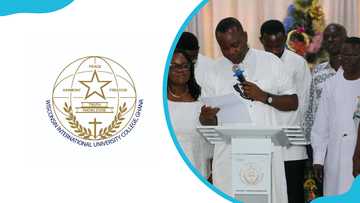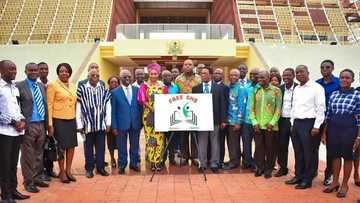Proposed Curriculum For Schools: Key Features And An Expert’s View On National Exams For Primary 2 Pupils
Since 2019, Ghana has been trying to institute key reforms in the educational curriculum for schools. After many delays, the country moved forward a bit by introducing reform proposals to improve reading, writing, arithmetic and creativity at the basic school level. YEN.com.gh presents a summary of the proposed reforms and the concerns raised by an educationist.
PAY ATTENTION: Сheck out news that is picked exactly for YOU ➡️ find “Recommended for you” block on the home page and enjoy!
The National Council for Curriculum and Assessment (NaCCA) in 2019 completed and handed new reforms in the curricula of school education to the Ghana Education Service (GES). But that curriculum was dogged by controversy, among them claims about the silent introduction of LGBTQ+ beliefs. It was withdrawn.
The NaCCA refined the content of the new curriculum, confident that the new proposals which cover all sectors of education in Ghana, will provide learners with the required foundation skills for lifelong learning, creativity and national development.

Source: UGC
YEN.com.gh summarises the new final proposals contained in the curriculum that is set to be implemented and the concerns raised by renowned educationist, Nii Armah Addy.
Summary Of New Educational Reforms In Ghana
The ministry of education has said the rationale for the proposals for the new reforms is to make education in Ghana “respond to a national priority of shifting the structure and content of the education system from merely passing examinations to building character, nurturing values, and raising literate, confident, and engaged citizens who can think critically.”
PAY ATTENTION: Click “See First” under the “Following” tab to see YEN.com.gh News on your News Feed!
The government hopes that the new curriculum will raise the quality of education at the pre-tertiary level, with emphasis on science and mathematics as fundamental building blocks for success in either tertiary education or early entry into the workplace.
The following 12 points summarise the proposals of the new education curriculum for Ghana:
1. Now “basic school” in Ghana comprises, kindergarten, primary school, junior high school (JHS) and senior high school (SHS).
2. Also, JHS 1, 2, 3 and SHS 1 will now be referred to as BS 7,8,9 and 10 respectively i. e. SHS 1 shall now be called BS 10.
3. A new programme, called “Common Core Programme” (CCP) will be run for all students in JHS 1 to SHS 1. The new CPP comprises nine subjects namely, Mathematics, Languages, Science, Religious and Moral Education (RME) (as stand-alone subject), Physical and Health Education (not examinable), Career Technology, Social Studies, Computing and Creative Art and Design.
4. A new national exams regime has been introduced called “Standard Assessment Test (NSAT)”. Leaners at Primary 2, 4, 6 and JHS 2 will take this test to enable them to move on to the next stage of their education.
5. Basic Education Certificate Examination (BECE) has now been cancelled. It will be replaced with placement exams at JHS 3 aimed at enrolling students into SHS1.
6. When students enter SHS1 (BS7) they will take the CPP subjects (Mathematics, Languages, Science, RME, Physical and Health Education, Career Technology, Social Studies, Computing and Creative Art and Design for one year. This means SHS1 students will no more do science, business, arts, etc programmes like they used to do before.
7. When students complete SHS1, they will have to write a Common Core Examination before they can enter into SHS 2.
8. It is at SHS 2 that students can select either a career-related programme which include, vocational and technical programmes or a high school diploma programmes such as science, business, arts. That is it is at SHS 2 (or BS8) that can select their preferred elective subjects.
9. There will no more be the West Africa Senior School Certification Examination (WASCCE). The exams that was run by the West Africa Examination Council (WAEC) has been scrapped and replaced with the university entrance exams at SHS3. SHS3 students who are successful in the Common Core Examinations will now get a Diploma Certificate instead of WASSCE certificate.
10. The new reforms will make Ghana’s education system focus on projects that will improve research and community engagement of learners with fewer contents.
11. The new Common Core Programme (CPP) of the new education system makes Computer Literacy a major focus. School and related education stakeholders have been admonished to be in a good position to provide adequate I.T. facilities for students
12. Science under the new education curriculum comprises physical and applied science which involves more of demonstrative features. It is sectioned into Diversity of matter, Cycle, System, Forces and Energy, Human and Environment.
Educationist Assesses New Education Curriculum For Ghana Schools
While many have praised the framers of the new education curriculum, there are fears new features such national examinations and examinations for children as young as 4 years could prove challenging.
Criticism of a national exams for Primary-2 pupils
Mr Nii Armah Addy, an expert with the Education Pillar of think tank Centre for Social Justice (CSJ), has said while there is a strong effort by the state agencies to inject a new life into the current education regime, the new reforms still emphasise examination.
“It is rather unfortunate that when the world, especially leading nations in early childhood education, are moving away from examination we are focusing on examination,” he told YEN.com.gh.
He said the prescribed national exams for P2, P4 and P6 pupils was problematic.
“Education must develop the entire person. So if our curriculum focuses on a one-hour examination or 30-minute examination, then I think we have a problem. I would rather prefer that we strengthen our continuous assessment, where daily attendance in school, courtesy for boys and girls and good personal hygiene, respect for parents and teachers and community engagement are emphasised,” he said.
Mr Armah said examinations should be made to carry a 30% weight while continuous assessment be given 70% weight.
“It is the continuous assessment that will keep the pupil or the learner continuously on their toes. Students spend a lot of time in schools, so schools must play a greater part in moulding the character of the students,” he stressed.
In his view, the proposed Standard Assessment Test (NSAT) will make Ghana lose its place in the international education community. He explained that NSAT, unlike WAEC’s WASSCE, will not be written with other West African countries.
“This means that the relevance of WAEC will be reduced and the qualifications and certificates of students will be limited to Ghana. Let’s open our system for other examination bodies to give students the chance to also continue internationally. I know the Cambridge and other exams are quite good but they are not written in our public schools. Let us consider it,” Mr Armah said.
Ghana Needs A National Development Plan For Education
The new education curriculum adds to the many reforms that have been introduced since independence in 1957. Mr Armah believes the cause of the constantly changing education curriculum is the absence of a National Development Plan for Education.
The educationist with the Centre for Social Justice thinks Ghana’s education seems to be at the whims of politicians, stressing that this affects the quality of education.
“Ghana needs a national development plan for education. This will ensure that whatever the Ghana Education Service or any other government agency on education decides will be consistent with a larger national plan and legislation. We must not leave education in the hands of our politicians. They have not helped,” he said.
He said it was about time education policy in Ghana became stabilised by a more progressive framework.
“Education policy must not be based on the whims and caprices of a politicians or on a political party manifesto. It must be a national effort. Our education must have a national direction, where people who have distinguished themselves in areas of education by their work or conduct are brought in to contribute to planning the country’s education direction,” he admonished.
Government Hopeful That New Education Curriculum Will Promote The Application And Use of Knowledge
In its framework for the new pre-tertiary education curriculum, the education ministry explained that prior to key reforms, the curricula used in pre-tertiary educational institutions in Ghana were structured mostly on the behavioural view of learning to the neglect of cognitive learning theories.
“Consequently, the content matter of the curriculum was pre-determined and specific approaches to teaching were suggested. In addition, the assessment of student learning was based on testing learners on an accumulation of isolated facts and skills. This led to rigid prescriptions of textbooks that were aligned to the various subject syllabuses.
“This also limited the ingenuity of the teacher. Standards-based reforms do not necessary conform to the strict adherence to the behavioural view of learning,” the government agency said.
The ministry said the role of the new framework was to emphasise the construction, application and use of knowledge in our schools by setting national standards.
“These national standards in turn can provide opportunities for directing learning and instruction. Furthermore, it allows for the appropriate management of assessment, since learning outcomes can be measured against comparable standards. As such, learning outcomes can be appropriately measured as indicators of the quality of the educational system,” the ministry justified.
While concerns about training of teachers, textbooks and allied tools to properly carry out these reforms remain another viable concern for educationists, it is trite to say that it is early days yet.
It is true that key structural reforms, like the kind the new curriculum proposes, are needed to train young learners to take up the mantle of national development. Time will soon tell if Ghana can win in that quest.
GES scraps new school curriculum for basic school; asks teachers to return to old one
Meanwhile, YEN.com.gh reported in a previous story that in April 2019, the Ghana Educational Service (GES), scrapped the curriculum it introduced for basic education.
The new curriculum came with a lot of misgivings one of them being that no textbooks had been provided to make the work easier.
However, news reaching YEN.com.gh indicates that the GES has directed all teachers to stop using the new curriculum for basic schools.
New feature: Сheck out news that is picked for YOU ➡️ find “Recommended for you” block on the home page and enjoy!
Source: YEN.com.gh









